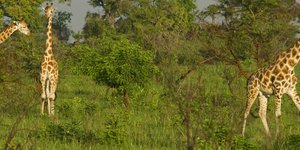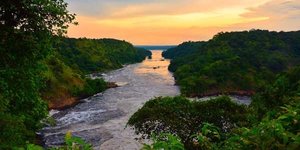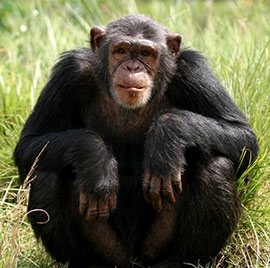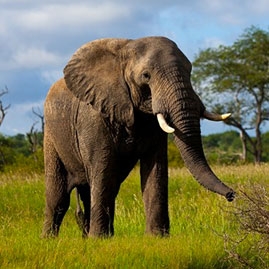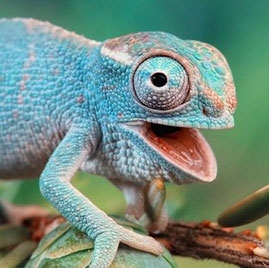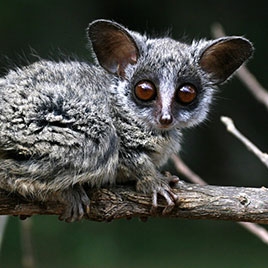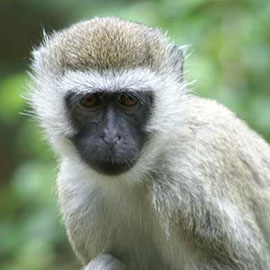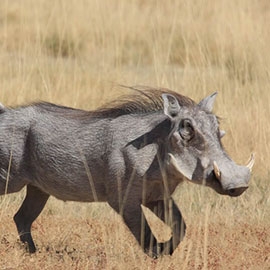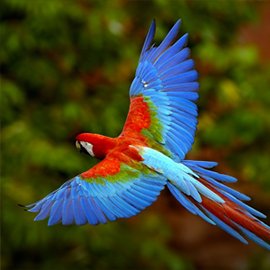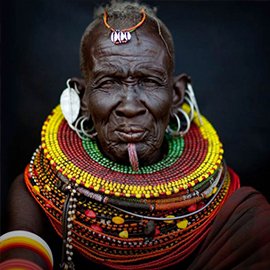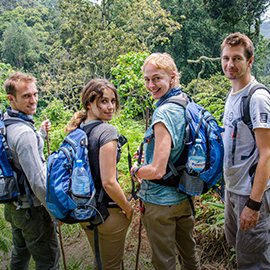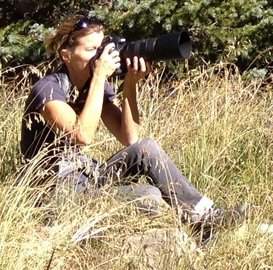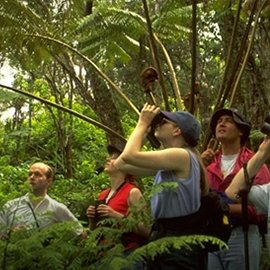Kibale National Park
Safari suitability: 7/10
Find your tourNo big five sightings, but prime for chimpanzee tracking and bird watching. Exploring can be done (and is recommended) on foot. During rainy season Jeep 4x4 highly suggested.
What YAS members think
Highlights
- Kibale National Park contains one of the last tropical forests in the country
- Biodiversity threatened by consumption and deforestation
- The park contains diverse species of mammals, including primates, as well as birds and trees
- Visit during the hot, dry months of January and February
- The park is highly favored for safaris of Chimpanzee tracking and bird watching
About Kibale National Park
Located in the southwestern region of Uganda, Kibale National Park covers about 795 km² (306.9 miles²). The park is between 1,100 m (3610 ft) and 1,600 m (5250 ft) above sea level and encompasses one of the country’s last remaining tropical forests. It is also one of the few remaining areas to contain both lowland and montane forests, such as wet tropical vegetation, woodland and savannah. This diversity of habitats is due to the range in altitude.
Two major tribes, the Batooro and Bakiga, inhabit the surrounding area of the park and use it for food, fuel and a number of other resources. Because populations have significantly increased, biodiversity within the park itself has been adversely affected. Although the park retains high ecological value, it has been threatened by consumptive use and deforestation over the last few decades.
Wildlife of Kibale National Park
Kibale National Park is home to 70 mammal species, including elephants and buffalo. Lions purportedly are still found here, but the reality is they are rarely, if ever, seen. Most notable among these is the diverse primate population, including the chimpanzee. The park also has over 375 bird species. Although the park is home to a diverse number of mammals, it is often hard to see them due to the dense forests. The park has over 351 types of trees, some rising over 55m (180 feet) and aged over 200 years old. However, this makes Kibale National Park a prime safari destination for chimpanzee tracking and bird watching. Visitors also have a choice of nature walks and tours of the volcanic crater lakes. There are two main tourism centers within the park, Kanyanchu River Camp and Sebitoli Forest Camp, which can be reached by car from a northern or southern route.
Kibale's proximity to Queen Elizabeth National Park (QENP) makes it easy for visitors to see both parks. Kibale lies to the north of QENP and the two touch via a game corridor.
When is the best time of year to visit Kibale?
The park is open year-round, but during the rainy season, which runs from October through December and March through May, roads are difficult to use. The dry season, during the months of June and September, the average temperature is 25 C (77 F), but even then visitors can anticipate the occasional thunderstorm, particularly in the northern, wettest part of the park. Overall, the climate is pleasant with annual temperatures ranging from 14 C to 27 C (57 F to 80 F), and visitors should expect cooler nights. The best time to visit is during the hot, dry months of January and February when animals will stay near the water.
I went for a trip to Kibale forest national a park. The park is amazing on our way we say many baboons, the Black and White Colobus monkey, the mangabey etc. This park is known as a home for the chimpanzees and various bird species and butterflies. I enjoyed my stay as I also saw many crater lakes in the area.
Sort by:
The national park is home to 13 primate species. It is well known for chimpanzee, they share 98% of human DNA closest to man kind and social and wise primates.
Find the rewarding tour and attractive destinations in Uganda. We visited Kibale it was good to meet these chimpanzees as soon as we entered the forest, where we found them relaxing. I have visited this place before more that 10 times and all has been so nice.
Before even you enter the jungle, the stunning voice from the various primates welcome you. Everything seen is exciting, but on seeing the chimpanzee, you just don't believe your eyes at the moment as chimpanzee play and do acrobatics from the canopy branches.
The park is few kms away from Fort Portal town. It has unique animal species such as the chimpanzees, black and white Colobus monkeys, beautiful butterflies and more. It's a fantastic park for trekkers and forest lovers. Tourist activities may include chimp trekking, community walks, birding, nature walk among others. The park is not very far from Queen Elizabeth, Semuliki and Mount Rwenzori National Parks.
Its past 6 months since I was on an 18-day safari through Uganda and Tanzania. I visited many attractions but Kibale Forest in Uganda was the highlight of these 18 days. We were a group of 6, travelled in a comfortable mini bus and were on a tight budget; therefore used lazy camping as our tour operator was able to provide it. Trekking through Kibale Forest was very interesting (the forest is thick and has many primates). After walking for 2 good hours, we came across a chimpanzee family and this was very magical. Chimpanzee tracking is expensive but worth the price. I recommend it for anyone planning a visit to Uganda. Sean
Kibale forest is beautiful and contains a vast number of bird species and many primates of which chimpanzees are the star attraction. There a 24 permits issued daily and one 'community' of habituated chimps which live in friendship groups which vary in size. The 24 guests are split into 3 groups. If you are questioning visiting the chimps before/after the gorillas, don't, just do it. We enjoyed the chimps as much as we enjoyed the gorillas. The terrain is much more flat and the vegetation is not as dense as Bwindi. You will see many other primate species while looking for chimps. As mentioned above,the terrain is not difficult though there are muddy patches and a few dense parts. This is a better choice than the challenging gorilla treks. The chimps were lovely to see. The guides are required to enforce the 8 metre rule vigorously to create some needed space for these beautiful creatures and also to allow people take nice pictures. Guest should listen to the guides carefully and follow the rules and advice. The ants are vicious here so I was glad I followed their advice to tuck trousers in socks and wear long sleeves. Other primates such as red tailed and Colobus monkeys are frequently seen.
As soon as you step into Kibale, you know it's special. A cathedral of nature, with primates as high-priests. We've been living and working in and around the park since 2000, and cannot resist returning year after year. This forest gets into your blood. Some highlights of our 15 years: -First chimp siting was a spectacular surprise, while out researching other animals in the park. The lone female crossed my path silently. In and out of view in a second. After a lifetime of dreaming of Africa and reading Goodall, Fossey, Owens, Hemingway and Ruark, this got the heart beating - finally arrived! Today, you may see huge groups of chimps close up - the troop is one of the largest ever habituated, at over 100. -The Goliath beetle sounds like like a Harley as it flies by. Never knew that. Wow. -The baboons figured out where the food was pretty quickly, so we learned to lock the doors just as quickly. When they sent their baby through the barred window and it retrieved nothing but tea, the family's disappointment was palpable. Sorry, Baboons, but we love the pineapple here - no leftovers. -Walking out to the cho at night can be a pain, but sometimes, on a dark night, thousands of moths will think your headlamp is the moon. Highly Recommended: Chimp trekking in Kanyanchu, of course, but also the forest walk, to enjoy the riches with fewer expectations and more surprises; visit to the community Science Centers in Kyanyawara, Kaswa or Isunga. Though animals were the reason that Africa was always the target, my best memories are of the warm and loving local people we've partnered with to help protect Kibale from incursions. Come out to visit our eco-briquette manufacture & trading post; watch a wildlife documentary with 500 excited Ugandans who love nature; or, for the very brave, taste dozens of bean dishes at one of the yearly fuel-efficient cook-offs. newnaturefoundation.org
The driver guide was kind to us, very patient, time-conscious. He easily adapted to our requests and culture and was very peaceful, smart and interesting. He was very knowledgeable about the park, made it exciting to track the chimpanzees.
Known to have one of Ugandas most gorgeous tropical forests, Kibale National park is one of the few parks containing both lowland and montane forests. The park is located in the districts of Kabarole and Kamwenge in Western Uganda It is an important eco-tourism and safari destination, popular for its vast number of bird species(375 species), 70 mammal species, home to a large number of endangered chimpanzees and 12 other remarkable primates which include the red colobus monkey. Surely, it is a wonderful place I would wish to tour all the time.
After somberly deciding Gorilla Trekking was just way too much money for my mid-twenty year old budget, my travel partner and I decided to check out chimpanzee trekking in Kibale National Park and discovered the option for chimp habituation experience during our research. What's the difference you ask? Chimp trekking allows only one hour with the chimps after hiking in to the forest to find them. With Chimp Habituation, you hike in at dawn (On paper at least; we're working on African time, so it was probably closer to 7:30am that we finally departed) and spend the entire day with them, observing and following, sometimes running in the woods with them, until as late at 7pm. It took us about 1 to 1 1/2 hours to find them in the forest, listening to their hoots and hollers and changing directions on the path based on our experienced guides judgement. The mid-morning watching was fun, but they were mostly high in the trees foraging for food. It'd be a shame if we chose only the 1 hour experience and this is all we saw. By afternoon, we saw all different behaviors. Some were relaxing on the forest floor, some young ones wrestling with each other, others chasing baboons trying to snatch babies for a snack, baby chimps practicing their swinging on (and falling off of) tree limbs, as well as a chimp couple trying to get intimate, but a young chimp kept interrupting them! It was a fascinating, amazing experience. We'd find ourselves in the middle of 15-30 chimps in the deep forests of Uganda, with sounds of the chimps hollering at adjacent groups booming around us. Since we took motorbikes from the place we were staying to the park entrance, we decided to leave at 3pm so we could get back when it was still light and see the route we took in the dark 5am that morning. But again, we could have stayed as long as 7pm. Overall, CHEX is only $220/person for the park permit and guide, while chimp trekking for the hour is $160/person. If you ask me, the $60 more is far worth it for the option to play Jane Goodall for a whole day. By far, this was one of my most memorable experiences in East Africa. If I ever go back, I will surely do it again! Side Note: We went in April which is considered the rainy season, which translates to low-tourist season. We literally were the only two in the entire National Park that day! And, lucky for us, it was a completely dry day!
Driving to Kibale National Park
The drive from Uganda's international airport in Entebbe takes around 5.5 hours, in normal conditions. For the intrepid traveler, there is also a bus that goes from Kampala to Kibale. It is around $10-$20 but takes nearly double the time.
If you are arriving in Kigali, Rwanda, the drive takes about 6.5 hours, not including border crossings.
Domestic flights to Kibale National Park
Aerolink Uganda offers daily flights from Entebbe to Semuliki, which is just under an hour's drive from Kibale.
The following airlines travel to Kibale National Park

AeroLink Uganda Limited is a domestic airline offering both scheduled and charter flights into Uganda's national parks. From its base at Entebbe International Airport, AeroLink using its Cessna Grand Caravans, offers daily flights into Bwindi Impenetrable Forest (Kihihi and Kisoro airstrips), Queen Elizabeth National Park (Kasese and Mweya airstrips), Murchison Falls (Bugungu, Pakuba and Chobe airstrips), Semuliki National Park (Semliki airstrip) and Kidepo Valley National Park (Apoka airstrip). Effective 1st June 2019, in partnership with its sister company Airkenya Express Limited, Aerolink commenced scheduled flights from Entebbe International Airport to the famous Maasai Mara in Kenya via Kisumu International Airport for Immigration. AeroLink Uganda is affiliated to Airkenya Express in Kenya and Regional Air Services in Tanzania. Visit website
Also flies to:



Based in Kampala, operates scheduled and charter services across eastern and central Africa. Eagle Air is a Private Ltd Company specialising in the provision of Charter and Schedule Air services both within Uganda and around the East & Central Africa Region. Eagle Air was incorporated as an air operator in June 1994. Visit website
Also flies to:












Kibale map
Nearby parks and game reserves
Related articles
Latest photos
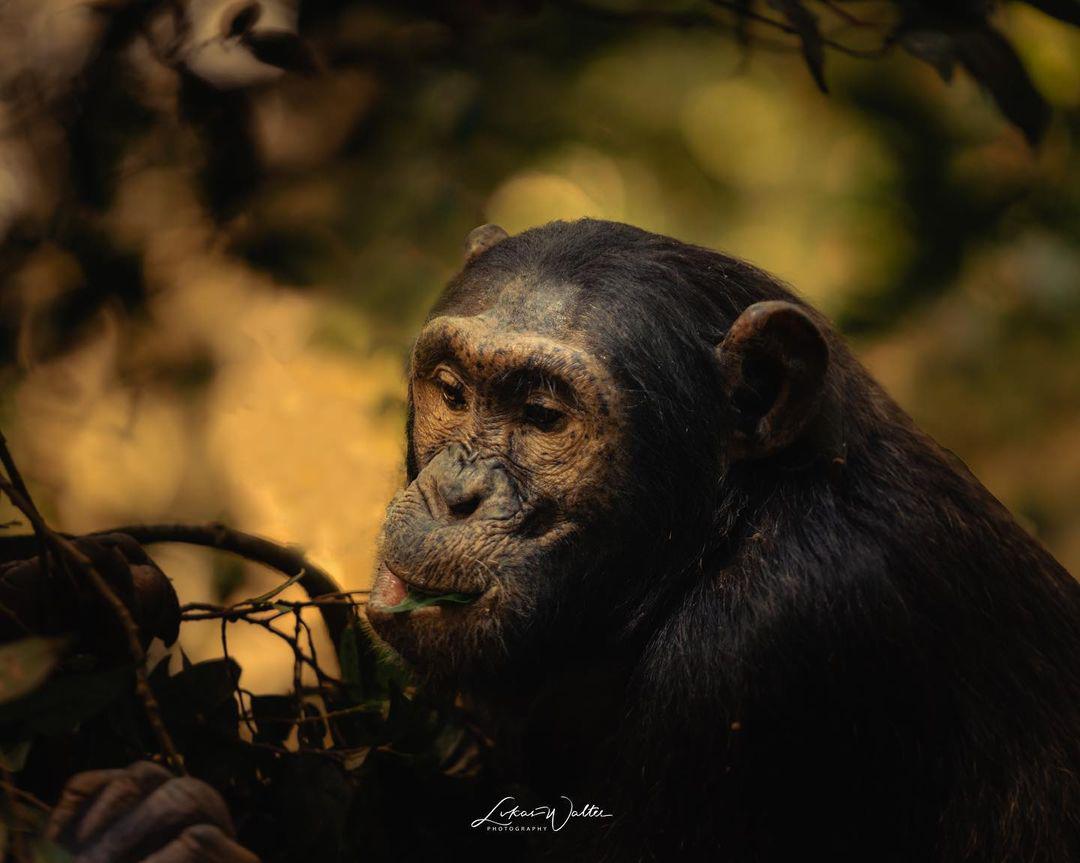


 Uganda
Uganda
 Norway
Norway
 United States
United States
